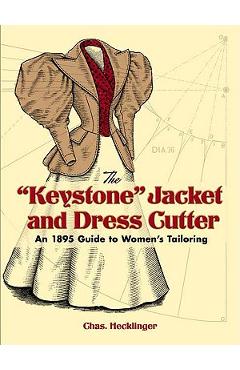The keystone Jacket and Dress Cutter: An 1895 Guide to Women\'s Tailoring - Chas Hecklinger

Detalii The keystone Jacket and Dress
libris.ro
61.1 Lei
67.89 Lei
Crafts & Hobbies
Chas Hecklinger
The keystone Jacket and Dress - Disponibil la libris.ro
Pe YEO găsești The keystone Jacket and Dress de la Chas Hecklinger, în categoria Crafts & Hobbies.
Indiferent de nevoile tale, The keystone Jacket and Dress Cutter: An 1895 Guide to Women\'s Tailoring - Chas Hecklinger din categoria Crafts & Hobbies îți poate aduce un echilibru perfect între calitate și preț, cu avantaje practice și moderne.
Preț: 61.1 Lei
Caracteristicile produsului The keystone Jacket and Dress
- Brand: Chas Hecklinger
- Categoria: Crafts & Hobbies
- Magazin: libris.ro
- Ultima actualizare: 28-10-2025 01:22:05
Comandă The keystone Jacket and Dress Online, Simplu și Rapid
Prin intermediul platformei YEO, poți comanda The keystone Jacket and Dress de la libris.ro rapid și în siguranță. Bucură-te de o experiență de cumpărături online optimizată și descoperă cele mai bune oferte actualizate constant.
Descriere magazin:
With opulent fashions the ultimate in style, women of the late Victorian era wore a great deal of silks and satins. Daring combinations of bright colors were in. So were large hats, profusely trimmed. But by the end of the nineteenth century, ladies\' tastes in fashion were changing, along with female lifestyles. Larger numbers of women were not only working outside the home, they were also playing tennis and golf, and riding bicycles and horses. All these activities called for a definite change in female fashions. Women came to rely on tailored suits with full skirts and fitted jackets over simple blouses. Riding habits called for a long, draped skirt worn over a pair of trousers. With the dawn of the twentieth century, professional tailors turned to the comprehensive 1895 Keystone guide to create office outfits, riding pants, shirtwaists, and other garments. Filled with more than eighty patterns, the handy resource provided tailors with suggestions for fabric choices as well as instructions for the proper measurement, fitting, cutting, and sewing of such items as a bolero jacket, a shirtwaist with yoke, a single-breasted vest, and riding breeches. Supplemented with a selection of newly captioned illustrations from The Delineator magazine, this volume will be a valuable reference for costume designers and fashion historians, and a fascinating window on the past for nostalgia enthusiasts.

Produse asemănătoare

The keystone Jacket and Dress Cutter: An 1895 Guide to Women\'s Tailoring - Chas Hecklinger
![]() libris.ro
libris.ro
Actualizat in 28/10/2025
61.1 Lei
Produse marca Chas Hecklinger

The keystone Jacket and Dress Cutter: An 1895 Guide to Women\'s Tailoring - Chas Hecklinger
![]() libris.ro
libris.ro
Actualizat in 28/10/2025
61.1 Lei